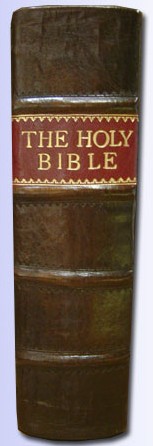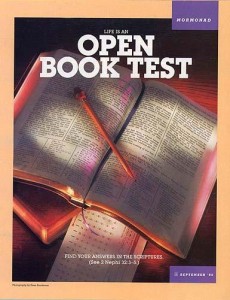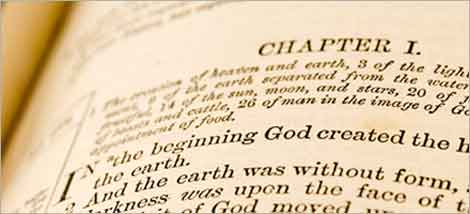You know that book the Mormons read?
> Twilight?
No. Try again.
> The Book of Mormon?
Yes, that’s the one. How much do you know about it?
> It’s the Mormon version of the Bible.
Um, okay. We need to talk. This article is for you.
First, it’d be good to understand what the Bible is. The Bible comes in two sections: the Old Testament and the New Testament. I’ll use bullets to summarize as quickly as I can:
- Begin date: “In the beginning…”
- Moses writes about creation, Eden, the flood, the tower of Babel, Abraham, the establishment and exodus of Israel.
- Law of Moses instituted for Israel.
- Other prophets and historians write about Israelite conquests and generally the lineage history of the house of Israel.
- Stories of the Lord’s intervention, prophets foretell Israel’s captivity in Babylon.
- Israel is taken captive by Babylon (around 600 BC), then eventually set free to rebuild; prophets foretell the coming of the Messiah.
- End date: About 400 BC.
New Testament
- Begin date: About 1 BC.
- Jesus is born and hailed as the Messiah, he grows up and starts teaching and performing miracles.
- Jesus is crucified for the world’s sins and is resurrected (33 AD); he establishes a Church on the shoulders of his Apostles.
- An important Jew (Saul) hates this upstart Church and tries to destroy it; he is later visited by Jesus and becomes Paul, an important missionary.
- Paul travels all over Mesopotamia, Greece, and Rome teaching about Jesus; many NT books are letters to his followers.
- Some writings from other Apostles (Peter, James, John, etc.).
- Prophesies of the eventual return of the Messiah, Jesus.
- End date: About 70 AD.
Mormons believe the teachings, visions, and prophecies in the Bible (both testaments) to be the word of God breathed to the prophets who served as scribes and mouthpieces for the Almighty.
> You’re kidding me. Mormons read the Bible? The same one I read?
Yup. We English-speaking Mormons prefer the King James Version.
> So, how is the Book of Mormon any different?
Well, let’s examine the Book of Mormon. It actually has two major sections, too. The first one is the main story:
- Begin date: About 600 BC.
- Israel is about to be taken captive by the Babylonians (see Old Testament, above); the Lord tells a prophet named Lehi to get his family out before it happens.
- They travel away from Jerusalem, through the desert, to the sea and build a ship.
- The Lord brings them across oceans to the American continent (they probably land in Mexico or Guatemala).
- Lehi’s family breaks apart into Nephites and Lamanites.
- A lineage history of the Nephites, their kings and the wars with the Lamanites.
- Prophesies of their future and of the coming Messiah.
- Signs testify when the Messiah is born (a new star, 1 BC), and when he dies (earthquakes, tempests, volcanoes, 33 AD).
- The resurrected Jesus arrives and shows crucifixion nail prints in his hands and feet, teaches the gospel, performs miracles, and sets up a Church.
- Peace reigns for centuries.
- Wickedness returns. The Nephite dynasty is destroyed.
- Mormon summarizes everything by inscribing this whole story on thin sheets of gold, bound in book form (about 400 AD).
- Mormon gives the gold plates to his son, Moroni, who adds the Jaredite history, journeys to a hill in New York, and buries them in a stone box.
- End date: About AD 421.
Jaredites
- Begin date: about 3,000 BC
- Jared and family are led by the Lord to leave the tower of Babel; they move out and build barges to float to the American continent (probably Mexico).
- Jared’s brother sees visions of the future and foretells the coming of a Messiah.
- Lineage history of Jared’s descendants; wars, kings, important events.
- Jaredites turn wicked and destroy themselves.
- Ether summarizes the account on metal plates, they are recovered by the Nephites, and added to the gold plates by Moroni.
- End date: about 600 BC.
> So, wait. That’s not even the Bible stories or anything. Instead of Moses and Paul you’ve got Nephi and Jared and Moroni.
Yes. It’s vital to see the distinction between the Bible and the Book of Mormon. They are about two completely separate groups of peoples on opposite sides of the globe. That’s the main difference. To put it simply:
Bible = Middle East
Book of Mormon = America
> But you mentioned Jesus. Is that the same Jesus as in the Bible? How does he show up in America?
Same Jesus, born in Bethlehem, raised in Nazareth: the Son of God. After he died and was resurrected, he appeared to the peoples of the Book of Mormon.
> I heard that the Book of Mormon replaces the Bible, and I’m not comfortable with that idea.
They are two very different accounts of separate peoples. They’re like cake and ice cream. Neither one is meant to replace the other. In fact, they are enhanced when used together. Give me both!
> Okay, but wouldn’t the Bible have mentioned something about the Book of Mormon?
It does! The Lord told the Bible prophet Ezekiel that the stick of Judah (the Bible) and the stick of Joseph (the Book of Mormon) will be joined together “and they shall become one in thine hand” (Ezekiel 37:16-17). Also, Jesus Christ taught the disciples that he had other sheep, “which are not of this fold” whom he intended to visit (John 10:16).
In the Book of Mormon, an angel explained to Nephi that “These last records [the Book of Mormon] . . . shall establish the truth of the first [the Bible] . . . and shall make known to all kindreds, tongues, and people that the Lamb of God is the Son of the Eternal Father, and the Savior of the world; and that all men must come unto him, or they cannot be saved” (1 Nephi 13:40).
What they have in common is their devotion to the Savior of all men. Jesus is the long-foretold Messiah. We may be saved from our sins and crimes and from death itself through His holy name. These books of scripture tell us how we can receive this precious gift. I recommend you read both. You may order a free copy of each from mormon.org (the official Church website).
> Alright. I’m clicking on that link right now!


 In August, I arrived in Des Moines, for medical school. Since I’ve been here, I’ve had a test just about every week. They’ve sure kept me busy and I’m always studying for the next exam. One morning as I was about to run out the door to school I noticed a card on my dresser. It was a picture of the scriptures with a little saying, “Life is an open book test. Find your answers in the scriptures.” And then it quoted from 2 Nephi in the Book of Mormon.
In August, I arrived in Des Moines, for medical school. Since I’ve been here, I’ve had a test just about every week. They’ve sure kept me busy and I’m always studying for the next exam. One morning as I was about to run out the door to school I noticed a card on my dresser. It was a picture of the scriptures with a little saying, “Life is an open book test. Find your answers in the scriptures.” And then it quoted from 2 Nephi in the Book of Mormon.